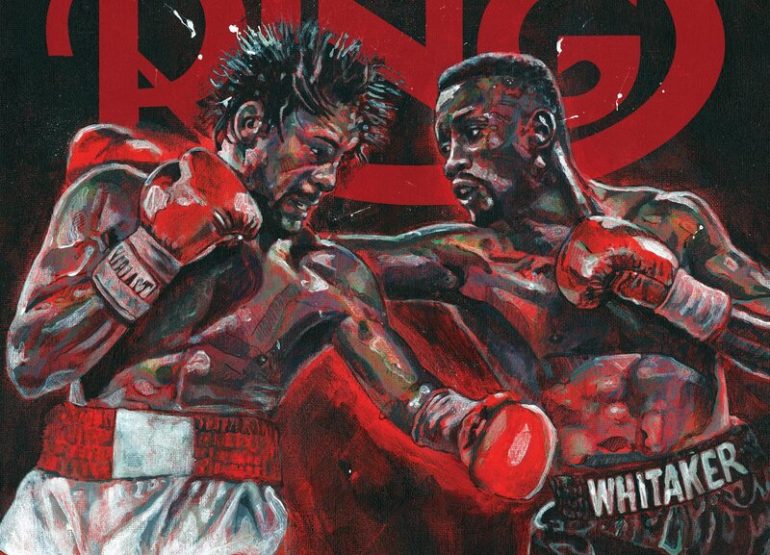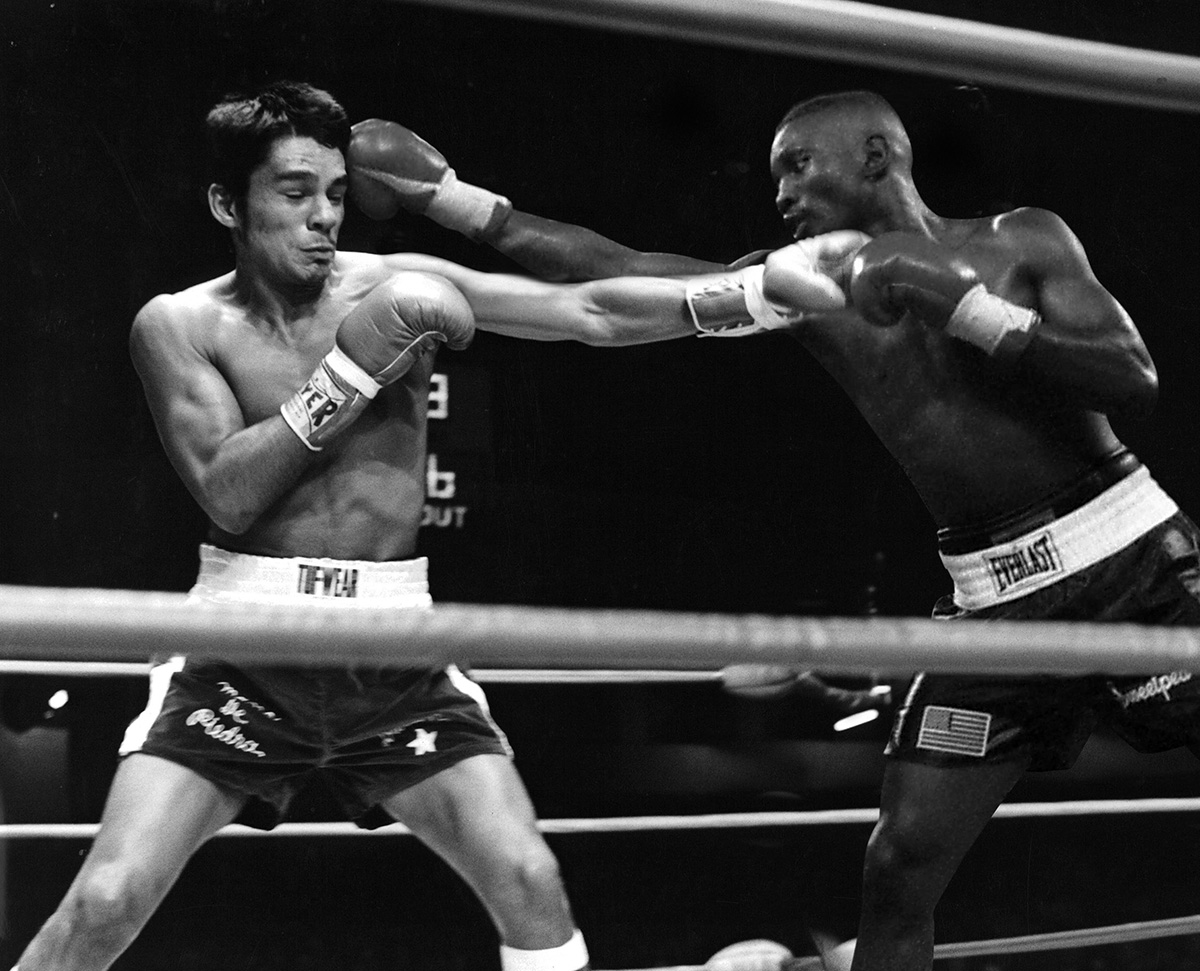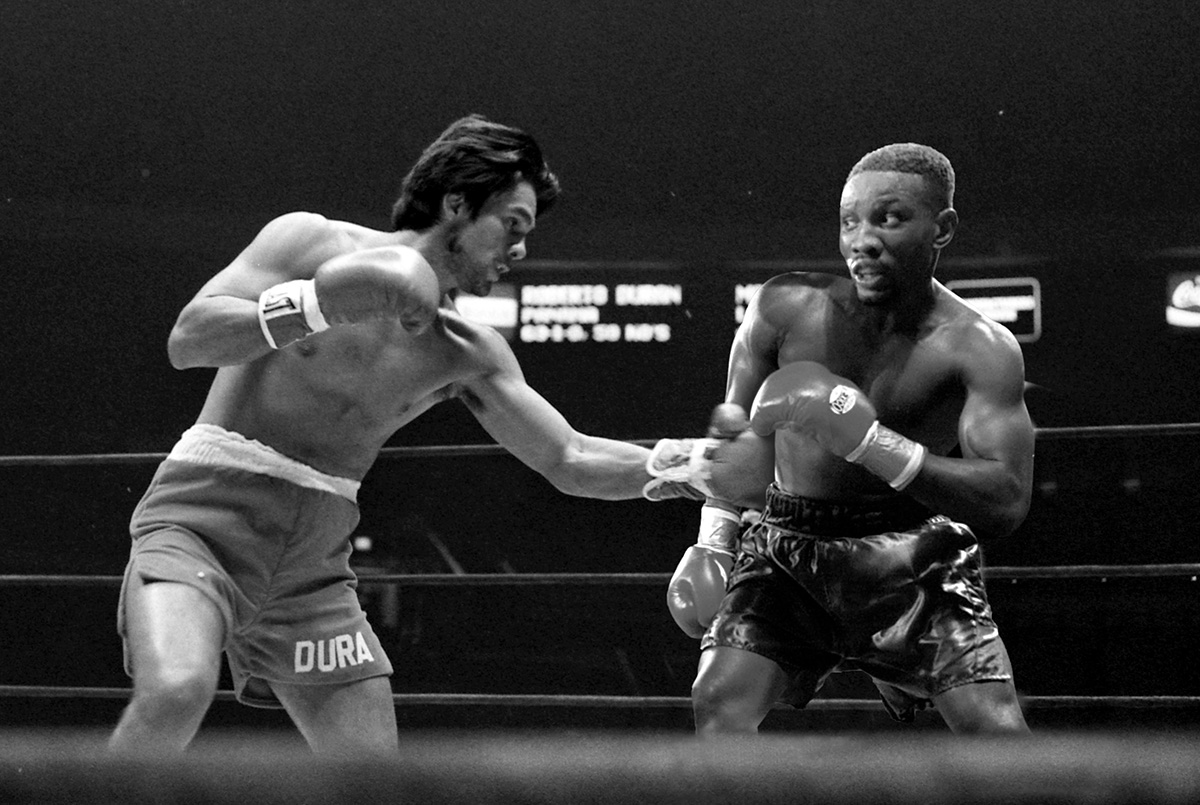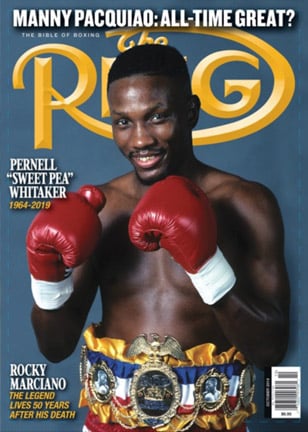Roberto Duran vs. Pernell Whitaker: The Perfect Storm

Editor’s Note: This feature originally appeared in the December 2021 issue of The Ring. The print copy is available for purchase at The Ring Shop.
A HALL-OF-FAME PANEL OF BOXING PUNDITS PONDER WHO WOULD HAVE WON A FIRE VS. FINESSE LIGHTWEIGHT MYTHICAL MATCHUP BETWEEN POUND-FOR-POUND GREATS ROBERTO DURAN AND PERNELL WHITAKER
At first blush it seems an easy call to make. When one fighter was known as “Manos de Piedra” (“Hands of Stone”) while the other was called “Sweet Pea,” what’s to debate? Would not hands of stone quite logically crush sweet peas? Not so fast, Sherlock, if the Sweet Pea in question is Pernell Whitaker.
Whitaker is one of the greatest boxers in the history of the sport. He was a master defensive fighter, but much more than that. He was a fighter who could turn defensive mastery into offensive mystery, which is why he held some form of a world championship for over eight years in his prime. It is also why he is considered one of the greatest lightweights in boxing history.
Whitaker was one of those rare fighters who would have been successful in any era, the skills that helped him dominate the 1990s easily transferable to the 1970s or the 1940s. But could he have found a way to bewitch and bewilder Roberto Duran, who many consider the greatest lightweight of all time? That is a question that makes a mythical showdown between them at 135 pounds difficult to sort out.
“Duran hit you like a Mack truck. Whitaker was a Porsche. You don’t want to be run over by a Mack truck, but who wants to get hit by a Porsche?”
– Teddy Atlas
Duran is certainly on the short list of the best lightweights in history alongside Ike Williams, Benny Leonard, Tony Canzoneri, Joe Gans, Lou Ambers and Carlos Ortiz. You could probably pare that list down even further and leave the debate to Duran, Williams, Leonard and Gans. But what turns a fight between Duran and Whitaker into a matchup of mythic proportions is that Whitaker belongs somewhere on that short list as well.
“A boxer like Whitaker in his prime is really hard to beat,” said 90-year-old former HBO analyst Larry Merchant, who saw both in their prime and so speaks not simply from the heart or a dusty record book but from personal recollection.
“In any showdown we had between a great boxer and a great banger, the boxer usually neutralized the banger and found a way to win … but we’re talking about Roberto Duran. Whitaker always managed to get the best of it, but Duran would have been the best of the best of them.
“Duran had boxing talent as well as unequaled relentlessness. His defense was often overlooked because he was such a ferociously relentless attacker. He knew how to corner a guy and break him down. At some point, Whitaker would have to cope with that pressure, and few people could against Duran at his best.
“Having said that, you can’t underestimate Whitaker. Yes, he was a boxer first, but in times of need he could turn it up and go for it, savagely at times, if he felt he had to or believed the opening was there.

“The crowd is an element in any close prizefight. It can influence judges. Whitaker was so good at what he did you had to respect him. He wasn’t just another boxer trying to avoid getting hit. But because of his style, Duran would have had the crowd on his side. The crowd would clap for Whitaker but roar for Duran, and that’s a factor that can’t be ignored with two fighters of their capabilities. It’s certainly a matchup I would have loved to see. In the end, my brain says Whitaker … but my gut says Duran.”
Perhaps Duran wears Whitaker down late in the fight, as he did to so many opponents. Then again, Whitaker could so frustrate and fluster Duran with his unorthodox southpaw style that he might begin to break down that legendary resolve and make it a fight on his terms. Nobody can say for sure, which is what makes this fight fascinating.
“Yes, [Whitaker] was a boxer first, but in times of need he could turn it up and go for it, savagely at times, if he felt he had to or believed the opening was there.”
– Larry Merchant
Proponents of either willingly conceded this is among the toughest dream matchups to analyze, and that was certainly true for boxing historian Mike Silver. When first presented with this idea, he immediately said, “This is such a tough matchup, I can’t come up with a quick answer. This will take some analysis.”
Silver then asked to revisit the question after spending two days watching film of each in some of their classic lightweight fights. Only then did he conclude who might win and why.
“Duran is undeniably one of boxing’s greatest fighters, but Whitaker was a great athlete with an unusual style, and that style makes this a great fight,” said Silver, who is the author of The Night the Referee Hit Back – Memorable Moments from the World of Boxing. “Some might look at the way Whitaker broke down Julio Cesar Chavez and say Duran was the same kind of opponent, but Whitaker never met an opponent like Duran. Everything Chavez brought to the table, Duran brings twice or three times as much. He was very intelligent, a harder puncher, and he varied his attack.
Read “Roberto Duran: Greatest Hits”
“Whitaker was an elusive speedster and a great athlete, but what’s lacking was technical expertise. In many fights he got away with a lot of things he wouldn’t have gotten away with against Duran, things that would have gotten him hit.
“Although it would be a difficult fight for both of them, after watching them at their best, I feel Duran’s relentless body attack and pressure would get to Whitaker in a way he could not escape for 12 rounds and certainly not for 15. I could see it possibly becoming ugly for Whitaker in the late rounds, but I think it unlikely Duran would knock him out. In my mind, Duran wins a decision.”
The potential length of the fight was significant to Hall of Fame trainer Freddie Roach. Roach admired both fighters and knew their styles well, so when he broke the fight down it really became two fights in his mind.
“In a 15-round fight, I like Duran,” Roach said. “In a 12-round fight, I like Whitaker. For 12 rounds, Whitaker might well be able to outbox Duran, but not over the real championship distance. Those three extra rounds make it a different fight altogether.
“Those last three rounds were often Duran’s best. He was so relentless and such a great finisher. Pernell had great speed and great skills, a defensive master, but I don’t think he had the power to keep Duran off him for 15 rounds.

“Duran was also a great boxer. Not good. Great. He didn’t get much credit for it, but it’s why he won so many times late in fights. Whitaker was flashier and more unpredictable with some of his moves, but the truth is they were both great boxers, and over 15 rounds the difference is one guy had a stronger punch. Eventually that’s the difference-maker.
“Whitaker had that speed and he was a natural fighter. He could improvise and frustrate you, standing right in front of you and still not getting hit. That can wear down a fighter’s mind, but Duran had the answer for that kind of fighter. He was a great body puncher. At first, he was just a tough guy who could knock you out with body shots and pressure, like he did against Ken Buchanan when he first won the lightweight title, but he had two great trainers in Ray Arcel and Freddie Brown and he learned how to box. When he did, who beat him?”
For 72 fights, nobody, although Esteban De Jesus was awarded a close 10-round decision in a non-title fight five months after Duran broke Buchanan apart. Duran was a 2-to-1 underdog that night in Madison Square Garden against Buchanan, a cute boxer with skills akin to Whitaker’s. What Duran did to him was nothing short of a mugging.
As things turned out, he later did the same to De Jesus, knocking him out in a title rematch and taking him apart in a third fight on January 21, 1978. That was Duran’s final night as a lightweight and he made it a memorable one, unifying the WBA and WBC titles by stopping De Jesus in the 12th round of what became a one-sided beating. When it was over, he had made clear his superiority not only over De Jesus but the entire division, leaving it with a 63-1 record.
“Duran was a rare combination of fire and brimstone. He had an attacking mentality, but it wasn’t just anger. It was controlled anger coupled with science.”
– Teddy Atlas
Longtime Philadelphia fight promoter and boxing historian J. Russell Peltz doesn’t question Duran’s place in history, but when he considered a matchup against Whitaker, his first thought was the night Wilfred Benitez outboxed Duran over 15 hard rounds. Benitez was himself a master boxer looking to counterpunch but also adept at standing straight in front of an opponent and fending off his punches as if he was fencing more than fighting.
“Benitez was in the same category as Whitaker,” Peltz said. “A clear win for Benitez leads me to believe Whitaker would have found a way to outpoint Duran.
“I think of Duran’s second fight with Edwin Viruet, too. He was also a master boxer and he gave Duran problems. Those kind of guys gave him trouble, and no one was more trouble in that regard than Whitaker.
“Pete would have had to step up the pace against Duran and not be outworked, because Duran was more active than Chavez and not as reckless. He was aggressive, but in a controlled way. Duran would have to get rough and dirty, which he was willing to do, but in the end it comes down to styles. It doesn’t take anything away from Duran. It’s just that someone like Whitaker was the worst possible matchup for him. Whitaker had the style to give Duran fits. He always hated fighting guys who weren’t there to be hit, and Whitaker certainly wasn’t.”
Whitaker once made that clear when he boasted, “I don’t care who I’m fighting. I don’t care if it’s God. If I don’t want God to hit me, He’s not going to hit me.”
Whitaker was the king of the big bamboozle. His longtime promotional stablemate and Olympic teammate Evander Holyfield once described him as “a sneaky guy, in a nice way.” What he meant was Whitaker could be dipping, diving, diverting and deluding an opponent with his defense and then, suddenly, drill him in the face two and three times and be gone, like smoke over an ashtray.
What would have made Whitaker particularly difficult for Duran is that he was impossible to figure out because often even he didn’t know what he might do next. He had defensive instincts almost without peer, bolstered by fast-twitch muscles that responded without hesitation to his every command. He was, in short, a handful for anybody, even Duran.
“Both guys have the means to give each other trouble,” Hall of Fame trainer Teddy Atlas said. “That’s what makes this interesting. It’s not Joe Frazier vs. Mike Tyson. It’s not just a thunderstorm and heavy rain. There’s a lot of elements to this.
“Duran was a rare combination of fire and brimstone. He had an attacking mentality, but it wasn’t just anger. It was controlled anger coupled with science. It’s rare in boxing that you see a guy with that level of intensity and that level of technique. A perpetual punching machine with a plan and the skill to execute it.

“Duran also was relentless. Punches affected him the way raindrops affect a windshield. They don’t. But he boxed like a guy who didn’t want to get hit. He was willing to get hit, but he had the technique and the smarts to avoid most of the damage that usually comes with his kind of relentlessness.
“Pernell was a guy who could stand right in front of you and you couldn’t hit him in the ass with a handful of buckshot, but he had another attribute most of those kind of guys don’t have. He had a willingness to come right back punching. Whitaker had an aptitude for staying in the pocket, making you miss by a half inch and then making you pay by being in position to throw back and having the mindset to do it. He didn’t make you miss by a foot, because then he wouldn’t be in position to land. Miss by an inch then – BANG! Hit you back. Pernell didn’t just come with defense. He also cared about getting in your ass.
“He did it in a different way, but like Duran he had the ability to get to an opponent’s soul. It was more subtle than Duran’s way but every bit as ferocious. Duran hit you like a Mack truck. Whitaker was a Porsche. You don’t want to be run over by a Mack truck, but who wants to get hit by a Porsche?”
“Whitaker had the style to give Duran fits. He always hated fighting guys who weren’t there to be hit, and Whitaker certainly wasn’t.”
– J. Russell Peltz
No one, including Duran, but he was willing to make that chilling bargain, as he did against Benitez when he lost a 15-round decision to him 15 months after the debacle of the second Leonard fight – the infamous “No mas” fight when Duran seemingly quit for no reason in the middle of what was at the time a close fight. His courageous effort against Benitez – in which he was still pressing in the fight’s final minutes after having trained on Coiba, a penal colony island 15 miles off the coast of Panama, to avoid the temptations of the fast life he’d begun to live after defeating Leonard to win the welterweight title on June 20, 1980 – won him back his reputation if not a junior middleweight title.
Duran was 72-1 after his win over Leonard, the only “loss” being to De Jesus. What would that Duran have done against Whitaker?
“It’s a very tricky fight to call,” Atlas said. “Pernell had the ability to negate power. Duran was a power pitcher. Whitaker was a pitcher who hit the corners and changed speeds. Either way, they both took the bat out of your hands. Pernell was so good, Duran would have had to be the guy who beat Leonard to win. Anything less, he’d lose, but at the end of the day, the very best Duran beats the very best Whitaker.”
Miguel Diaz, the 83-year-old trainer and cut man extraordinaire, agrees. In his mind, Duran was “the best fighter I’ve seen in my life. Whitaker was good, but Duran was the best of the best.
“Roberto was a natural born fighter. He could box much better than people imagine. He finished his career with barely a cut around his eyes. It would have been very difficult, but Roberto would have found a way. You can’t say Whitaker was nothing. He was a puzzle, hard to solve. Whitaker was a master of defense, but Roberto was the master of boxing.”
Former light heavyweight champion and veteran trainer Eddie Mustafa Muhammad’s first reaction to such a match was, “That’s a great one.” His next reaction?
“I got to go with Duran,” Muhammad said. “Duran wasn’t just a great puncher. He had speed at lightweight. His defense was great, too. Pernell was a great boxer also, but Duran was a huge puncher at 135 and a great boxer.
“At lightweight, Duran was quick enough to cut the ring off and knew how to do it and then go to the body to slow Whitaker down. He didn’t care where he hit you. Ribs, hips, maybe below the belt. However he had to do it, he’d slow you down … then he’d come get you. This wouldn’t be a runaway, but Duran finds a way to win.”
At 135 pounds, that’s what they both did. After he beat De Jesus a third time and said goodbye to lightweight, Duran had only one loss in 64 fights. Whitaker was 23-1 when he became the first undisputed lightweight champion since Duran, stopping Juan Nazario in one round on August 11, 1990. He would defend the undisputed crown three times, finishing 27-1 before moving up in weight. For argument’s sake, let’s say both squared off as the final fight of their lightweight careers. They would have been a combined 90-2 with both losses later avenged. This would have been a duel between two of boxing’s greatest lightweights that demanded the winner muster all his skill, will, ring generalship and tenacity to win.
“Ribs, hips, maybe below the belt. However [Duran] had to do it, he’d slow you down … then he’d come get you.”
– Eddie Mustafa Muhammad
“It’s the perfect lightweight matchup of all time, when you think about it,” said veteran ringside analyst Al Bernstein. “The Duran who stopped Ken Buchanan was a terrific fighter. Buchanan had many of the same skills as Whitaker but he couldn’t deal with the ferocity of Duran. That’s what this fight boils down to.
“Whitaker dominated a good, aggressive fighter in Chavez, but Duran was a more nuanced fighter. He had more boxing skill and the same relentlessness. In the end, every Whitaker fight revolved around ‘Could his opponent hit him?’ I don’t think Duran would be worried about the preciseness of his punches. He’d just land somewhere, and at some point Whitaker would have to be more offensive than he liked to deal with Duran’s relentlessness better than Buchanan did.
“Who’s the referee? That’s part of it, too. Would he be someone who breaks them all the time or would he let Duran work inside and get away with some of the dirty things he would do if you let him? Is it going to be a knife fight or a pillow fight? The referee plays a huge role in that.”
Bernstein then addressed the big question: “The winner? That’s a rough one. Oh my God! I’m going to say Whitaker. I know Duran at 135 was a beast. Whitaker would have to deal with his aura as well as his skill. I think he could. I think he could frustrate Duran and throw him off his game. If not, he loses.”
That is how razor-thin the margin is between them. Top Rank matchmaker Bruce Trampler chose Duran but quickly added, “Whitaker is a tough out. It’s a 6-5 pick ‘em fight. It’s a close, hard fight for them both. The only thing I’m really sure of is it would have been a great series of fights. You don’t decide things between two fighters as great as those two in one night.”
READ THE LATEST ISSUE OF THE RING FOR FREE VIA THE NEW APP NOW. SUBSCRIBE NOW TO ACCESS MORE THAN 10 YEARS OF BACK ISSUES.

















